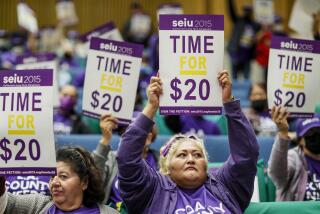Government Seeks to Spur Imports by Boosting Workers’ Purchasing Power Japan Joins Unions in Push for Pay Hikes
- Share via
TOKYO — Trade friction between Japan and the Unites States has created an unusual alliance this year for the annual “spring labor offensive” here.
The government of Prime Minister Yasuhiro Nakasone has joined the labor unions in citing Japan’s massive trade surplus as a reason for increasing wages--creating more consumer purchasing power and thus bringing in more foreign goods.
“I want enterprises that can afford to do so to give high wage increases,” Nakasone declared in Parliament.
Michio Watanabe, the minister of international trade and industry, went a step further and invited in officials of the four largest labor federations for an informal conversation last Wednesday. No minister of international trade and industry had ever met with labor leaders before and the fact that Watanabe chose to do it on the eve of labor’s biggest push gave added significance to the move.
He raised no protest when the labor leaders argued that shorter working hours and an increase in disposable income--to be achieved through higher wages and an income tax cut--are needed “to dissolve overseas economic friction.”
The United States has been arguing that Japan must find ways to increase domestic consumer spending because that would mean greater expenditures by the Japanese on imported goods and that, in turn, would mean that the huge U.S. trade deficit with Japan might be reduced.
The overall results of the annual campaign for higher wages will not be known until mid-summer, but some important labor settlements are expected in the days just ahead.
Last December, the government’s Economic Policy Council declared that the fruits of Japan’s economic success “must be passed on to workers in the form of higher wages and shorter working hours to increase disposable income.”
Other Recommendations
Nakasone’s Advisory Commission for Economic Structural Adjustment for International Harmony has also recommended higher wage increases to spur consumer spending. And it urged employers to adopt the five-day week and let their workers take extended vacations.
The newspaper Asahi, urging workers to press for shorter hours as well as for higher wages, said in an editorial that “Japan’s life style must be reconsidered in all aspects from the standpoint of the trade imbalance.”
The Ministry of International Trade estimates that extending the five-day week to all workers--only 27% of the labor force now works only five days a week--would increase consumer spending by 3 trillion yen a year ($17.1 billion).
Even Noboru Goto, chairman of the Japan Chamber of Commerce and president of the Tobu Railway Corp., has come down on the workers’ side. He said recently that wages have not kept up with gains in productivity in recent years, and that employers should make up the difference this year.
Goto’s statement spurred a storm of protest from the Federation of Employers Assns. Yet Goto, a confidant of Prime Minister Nakasone, was not deterred. He repeated his statement.
Unions are seeking a pay raise of 7%, a target described as preposterous by Bunpei Otsuki, chairman of the employers’ federation. Otsuki insists that increases should not exceed 3%, or be held to the level of increased productivity.
In recent years, labor has failed to win even that much in higher wages. In February, the Industrial Structural Council of the Ministry of International Trade and Industry reported that “wage increases, compared with gains in labor productivity, have been low.”
And in fiscal 1983, real wages, after being adjusted for the effects of inflation, rose only 0.6%, while productivity went up 2.4%. In fiscal 1984, real wages went up 1.5%, while productivity rose 4%.
In the past five years, productivity in manufacturing has improved 25%, while real wages have grown by only 11%.
Although wage increases last year for workers at major companies averaged 5.03%, wages overall rose by only 3.2%, the Labor Ministry said. It was the lowest rate of increase since 1964, when the ministry started keeping statistics.
Business executives, who traditionally complain of severe conditions as the labor offensive approaches, have armed themselves with a new argument this year. The recent steep appreciation of the yen, which increases the price--thus decreasing the attractiveness--of Japanese products sold overseas, will cut deeply into profits, they say. Some executives have gone so far as to cut their own salaries.
Executives’ Pay Cut
Executives at Nissan Motor reduced their salaries last month by 10%, for example, and four steel firms--Nippon Steel, Nippon Kokan, Kobe Steel and Sumitomo Metals--have also announced cuts in executive pay, ranging from 8% to 20%. Noritake, Japan’s leading maker of chinaware, cut executive salaries by up to 10%.
One intriguing tale of woe came from Shoichiro Toyoda, president of Toyota, which is Japan’s No. 1 auto maker and turns out 3.5 million cars a year. Toyoda said that because his firm faces new competition from South Korea, wage increases must be held to the minimum. Auto production in South Korea amounts to only about a tenth of Toyota’s.
Toyota executives have also used as an excuse for a small wage increase this year the argument that a big boost for Toyota workers would deal “harmful effects upon other industries.”
Indeed, keeping an eye on other industries, particularly the steel and shipbuilding industries, has become a tradition of the annual wage campaign. In earlier years, it helped raise wages.
Keeps Wages Down
But growth in steel and shipbuilding has slackened since the oil crisis of 1973-74, and the custom has worked to contain wages. Instead of following the leader, unions find themselves following the loser.
Steelworkers, for example, were given a pay increase last year of 9,000 yen a month ($51.43 at the present exchange rate). This amounts to 3.87%, and compares with an average for all private industries of 5.03%. Without a follow-steel pattern, wage increases in electronics and auto firms would have gone up far more.
Although the steelworkers’ union this year has set a 5.77% goal of 13,900 yen a month ($79.43), the union is bracing for less than 3%. Steel executives complain that production threatens to fall below 100 million tons for the first time in four years.
Unions representing workers at Mitsui Shipbuilding and Hitachi Shipbuilding, both of which expect to report losses for the six-month period that ended March 31, have gone so far as to make no request for a wage increase--in exchange for assurances of job security.
Hitachi Shipbuilding has already decided to pay no dividend for the period, the first time in 31 years it has taken such a step.
Electronics firms complain that a decline in export profits brought on by appreciation of the yen, coming on top of a slump in semiconductor sales, will force them to hold down wage increases, possibly to below 5%, despite prospects for future growth.
Overall, wages in manufacturing are expected to rise by about 4.5%, about 0.5% less than last year. This could amount to a defeat not only for the workers but for the government, which is attempting to pump up the domestic economy through greater consumption.
The Liaison Assn. of National Consumers Organizations calculates that the potential extra spending power of a wage increase averaging 4% to 4.9% would be wiped out by higher taxes, larger Social Security and health insurance payments, and an increase in the cost of living.
So far, appreciation of the yen has not affected jobs. Unemployment in February, five months after the yen started its steep climb, actually decreased by a tenth of a percentage point, to 2.6%. Employment was up by 160,000 jobs in manufacturing and construction, compared to February of 1985.
More to Read
Sign up for Essential California
The most important California stories and recommendations in your inbox every morning.
You may occasionally receive promotional content from the Los Angeles Times.










